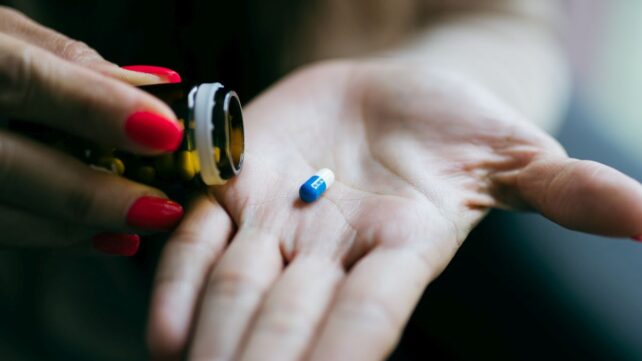A major new clinical trial involving more than 1,600 people has found that a GLP-1 pill form of the drug orforglipron works about as well as injectable semaglutide for people with type 2 diabetes.
Following an experiment conducted over 72 weeks and across 136 sites in 10 countries, a team led by obesity-medicine specialist Deborah Horn of the University of Texas reported that participants lost an average of 9.6 percent of their body weight on the highest dose of the drug.
That's comparable to the roughly 10 to 15 percent loss in body mass commonly seen in people with diabetes taking injectable semaglutide over a similar period.
Related: Breakthrough Diabetes Treatment May Deliver Insulin Through a Skin Cream
"Overall," the researchers write in their paper, "the findings indicate that orforglipron could address the unmet need for oral therapy by achieving outcomes similar to those of injectable GLP-1 receptor agonists, potentially shifting treatment paradigms."

GLP-1 drugs exploit the body's natural mechanisms for reducing appetite after a meal. When you eat, your gut releases a hormone called glucagon-like peptide-1 (GLP-1), which activates receptors in various organs. When these receptors are triggered, a few things happen: your appetite decreases, your pancreas increases insulin and reduces glucagon release, and digestion slows so blood sugar rises more gradually.
GLP-1 drugs are synthetic mimics of that hormone, triggering the same pathways in ways that can help people with diabetes regulate their blood sugar, and, more recently, assist people in losing weight.
For now, the drug can only be administered by injection. Its peptides break down too quickly in stomach acid, ruling out oral doses of the medication.
Orforglipron, by contrast, is not a peptide, but still activates the same receptor as GLP-1. It's also absorbed in the digestive tract like a more conventional drug. So far, signs of its efficacy are promising: a previous clinical trial involving 3,127 people with obesity, but without diabetes, showed an average 12.4 percent loss in body weight.

This new study was designed to observe how the drug behaves in people with type 2 diabetes. The 1,613 participants had all been diagnosed with the condition and were classified as either overweight or obese. The average age of the participants was 57, and the average weight was 101 kilograms (223 pounds).
Participants were sorted into four groups. One group was given a placebo with no active drug ingredients to serve as a control. The other three groups were given orforglipron at a dosage of either 6, 12, or 36 milligrams. For 72 weeks, each participant took a daily dose of their assigned pill while maintaining a diet in which 500 calories had been cut from their baseline.
Neither the researchers nor the participants knew which pill each participant was taking, a technique known as double-blinding that reduces bias when interpreting the results.
Those results were pretty conclusive. The group on the highest dose, 36 milligrams, lost, on average, 9.6 percent of their body weight, or around 9.6 kilograms. The 12-milligram group lost an average of 7 percent of their body weight, and the 6-milligram group 5.1 percent. The placebo group, on average, lost 2.5 percent.
An astonishing 26 percent of the group on the highest dose lost more than 15 percent of their body weight.
Meanwhile, other health indicators had improved. Blood sugar markers showed a significant improvement for all doses of orforglipron compared to the placebo, and heart, inflammation, and blood pressure markers also improved. Side effects were similar to the side effects of injectable GLP-1 drugs; nausea, diarrhea, vomiting, and constipation – all unsurprising, given the way the drug works.
Related: One Weight Loss Strategy Is 5x More Effective Than Ozempic, Trials Find
It's not quite as effective as a once-weekly 15-milligram injection of GLP-1 drug tirzepatide, which demonstrated an average of 14.7 percent of body weight lost in diabetic participants in an earlier clinical trial, but the ease, comfort, and accessibility of a pill may make the slightly lower effectiveness a worthwhile trade-off for some.
"We know it is harder for individuals with diabetes to lose weight. It is exciting to have an oral medication that provides double-digit weight loss, which on average was 23 pounds," Horn says.
"Once FDA approved, orforglipron is scheduled to be available in 2026 at a significantly decreased cost compared to current injectables. This could position it to be the 'metformin' of obesity and become widely covered by insurance plans, opening the door to treatment for all."
The research was funded by the pharmaceutical company Eli Lilly and has been published in The Lancet.

